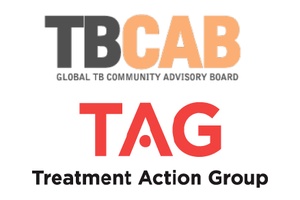TB CAB, TAG open letter to the Global Plan Development Task Force
Re: Programmatic and research targets for the Global Plan to Stop TB, 2016–2020
On May 5, 2015 the Global TB Community Advisory Board (TB CAB) and Treatment Action Group (TAG) sent an open letter to the Global Plan Development Task Force reiterating the urgent need for inclusion of evidence-based and ambitious programmatic and research and development (R&D) funding targets in the Global Plan to Stop TB, 2016–2020.
For the programmatic component of the
Global Plan, while supporting the inclusion of targets for
“90-90-90” (90% of vulnerable and at-risk
populations are screened for TB; 90% of all TB cases are
diagnosed and started on treatment; and 90% of those started on
treatment have a successful outcome), the letter encourages the
inclusion of one more “90”– 90% of those for
whom preventive therapy is indicated complete preventive
therapy. These four targets, as it is stated in the letter, are
necessary to achieve the post-2015 milestones set forth in the
World Health Organization’s End TB Strategy. Furthermore,
it is stressed that the inclusion of pediatric-specific program
intervention costs in the setting-specific investment packages
is needed to ensure the inclusion of children in TB programs and
budgets in the post-2015 period.
For the research component of the
Global Plan, the letter encourages the inclusion of concrete investment
targets for each of the following categories: drugs, vaccines,
diagnostics, basic research, and operational research. The
letter
once again
urges the Global Plan Development Task Force to develop and
include pediatric-specific funding targets for research to close
existing gaps for developing tools appropriate for children.
“The Global Plan serves as a call to action on which
broader conversations on country program initiatives and
R&D funding will be based. The inclusion of evidence-based
and ambitious targets in the Global Plan is necessary to
ensure that the long-standing neglect of TB programs and
research does not continue in the post-2015 period.”
To download the open letter, click here.


